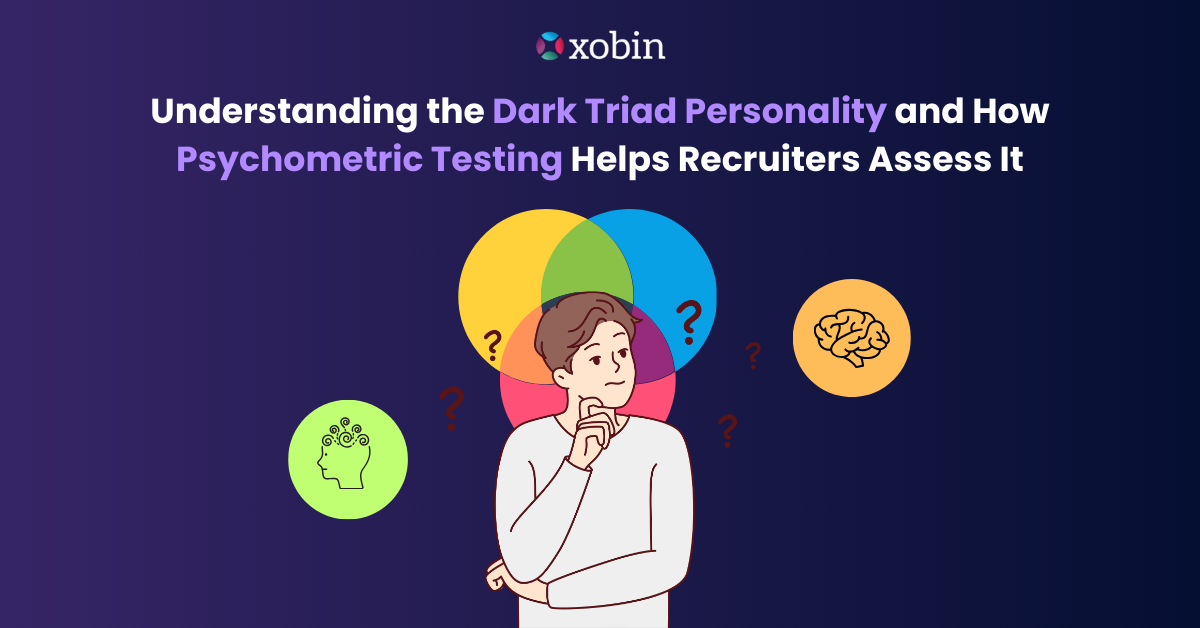When you’re hiring for a new position, what’s the one thing you don’t want to take a chance on? A toxic employee. Unfortunately, sometimes even the most polished candidates can carry hidden personality traits that can disrupt your team, harm company culture, and ultimately affect productivity. It’s easy to focus on qualifications, experience, and technical skills, but what about a candidate’s dark personality traits? This is where understanding the dark triad personality becomes important.
But what exactly is this? How can you identify these traits, and more importantly, how do you assess them? In this blog, we will dive deep into the concept of the dark triad personality, explain why it’s critical for recruiters to assess it, and explore how psychometric testing can help in identifying these traits. So, let’s get started!
Table of Contents
What is Dark Triad Personality?
The dark triad personality refers to a set of three personality traits that are associated with negative behavior patterns, meaning they tend to have a negative impact on personal and professional relationships. These traits are:
- Narcissism
- Machiavellianism
- Psychopathy
While these traits might sound extreme, they exist on a spectrum, and it’s important to understand that not everyone exhibiting them is dangerous or manipulative. However, when present in excess, these traits can significantly harm workplace dynamics, collaboration, and overall company culture.
Narcissism: The Desire for Admiration
Narcissists have an inflated sense of self-importance and a strong need for admiration from others. They often display an exaggerated sense of superiority, believe they are entitled to special treatment, and struggle with empathy. While some narcissistic traits (such as confidence) can be advantageous in certain situations, extreme narcissism can lead to problems in team environments and interpersonal relationships.
Machiavellianism: The Manipulator
Machiavellians are characterized by their manipulative tendencies. They tend to be deceitful, cunning, and willing to exploit others to achieve their goals. They often view the world as a game where they need to outsmart others to win. In a work environment, this can translate into unethical behavior, backstabbing, and the undermining of colleagues.
Psychopathy: The Lack of Empathy
Psychopaths are marked by a lack of empathy, impulsivity, and a disregard for the feelings or rights of others. They may appear charming at first, but underneath the surface, they are often callous, ruthless, and prone to taking extreme actions to achieve their goals. While not all psychopaths are violent, those with high levels of this trait can contribute to a toxic work environment, especially if they engage in unethical or illegal practices.
Why is it Important for Recruiters to Identify Dark Triad Personality?
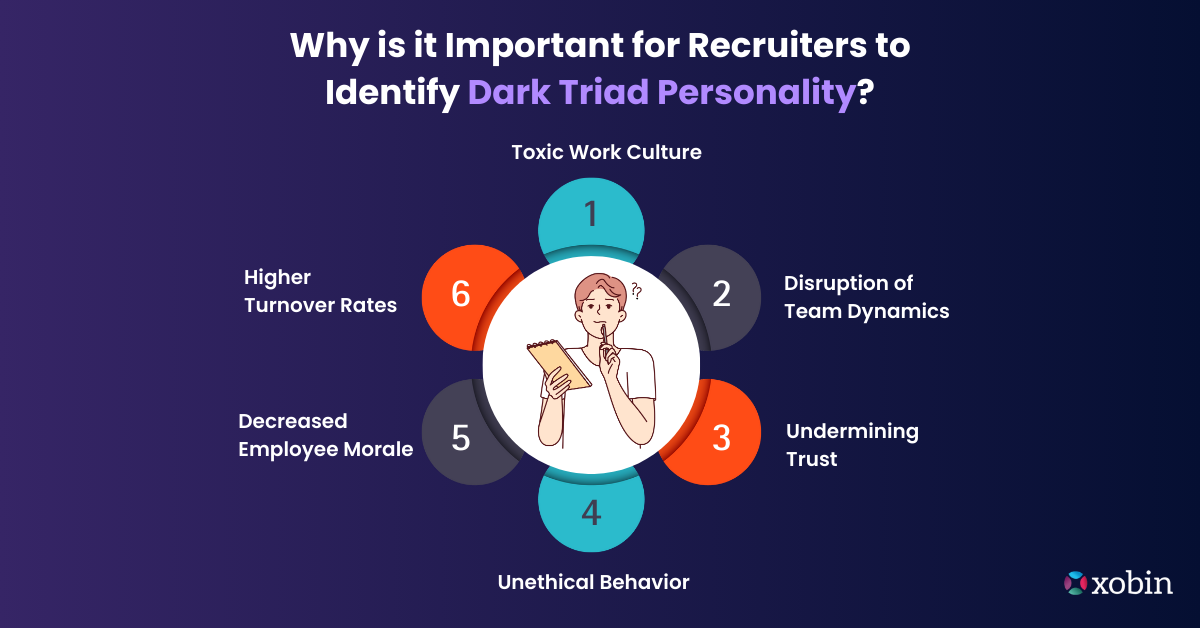
The dark triad personality can have significant consequences for any organization. These individuals may disrupt teamwork, create a toxic work environment, or even lead to higher turnover rates. Here are some ways in which dark personality traits can impact your workplace:
Toxic Work Culture
Narcissism, Machiavellianism, and Psychopathy can contribute to an environment of distrust, manipulation, and fear. Employees with these traits might create a toxic atmosphere, lowering morale and productivity.
Disruption of Team Dynamics
People with dark triad personality tend to be self-centered and manipulative, which can damage team collaboration. Narcissists may seek to dominate conversations and decision-making processes, while Machiavellians may manipulate team members for their own advantage.
Undermining Trust
Trust is crucial in any workplace, and people with high levels of Psychopathy often lack the emotional connection that makes trust-building possible. Their lack of empathy can lead to unethical decisions, making colleagues wary of their actions.
Unethical Behavior
Individuals high in Machiavellianism or psychopathy are more likely to engage in unethical behavior, such as dishonesty, manipulation, and exploitation, which can harm the company’s reputation and even lead to legal issues.
Decreased Employee Morale
A person with a dark triad personality often lacks consideration for the well-being of others. Their manipulative and selfish behaviors can cause stress and disengagement among colleagues, leading to lower morale and productivity.
Higher Turnover Rates
Employees who work alongside individuals with dark triad personality may quickly become frustrated and leave the organization. This can lead to high turnover rates, which ultimately harms the company’s bottom line.
Ways to Assess Dark Triad Personality in Candidates
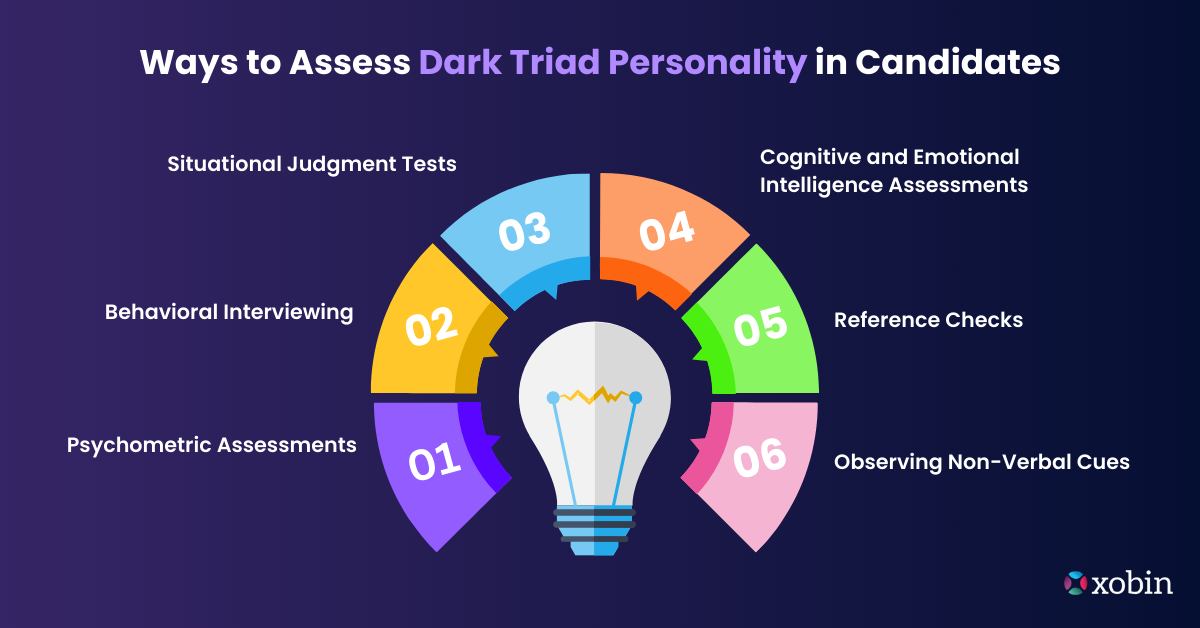
Assessing the Dark Triad in candidates can be tricky because individuals with these traits are often very skilled at masking their true nature during interviews. However, there are several approaches you can take to evaluate whether a candidate may exhibit these harmful personality traits.
1. Psychometric Assessments
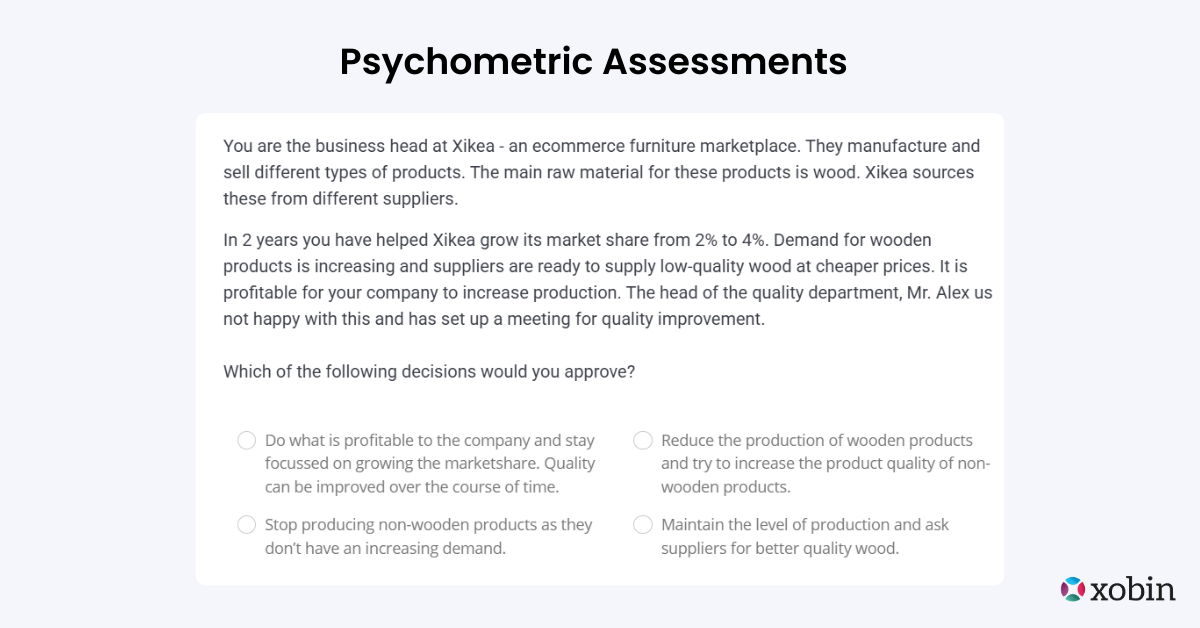
One of the most effective ways to assess personality traits, including those associated with the Dark Triad, is through psychometric tests. These assessments are designed to evaluate a candidate’s personality, emotional intelligence, and cognitive abilities.
Several personality evaluation tests, such as the Dark Triad Dirty Dozen (DTDD) or the Short Dark Triad (SD3), have been specifically developed to measure these three traits. These tests include statements that candidates must rate on a scale, such as “I like to be the center of attention” for narcissism, “I would cheat to get ahead” for Machiavellianism, and “I don’t feel guilty after hurting others” for psychopathy.
Psychometric testing is beneficial because it is based on scientific principles and can provide insights into a candidate’s personality beyond what is visible in an interview.
2. Behavioral Interviewing
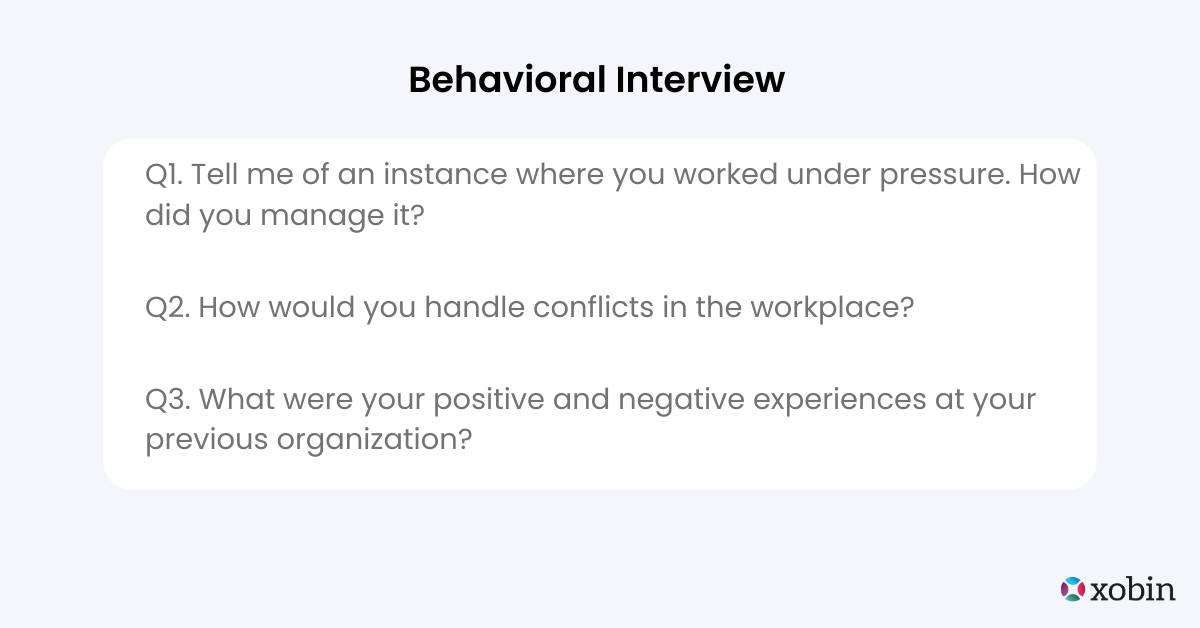
While psychometric tests can provide objective data, behavioral interviews can give recruiters an opportunity to explore past experiences and responses to real-life scenarios. Use questions that focus on teamwork, conflict resolution, and handling adversity.
For instance, you might ask:
- “Tell me about a time when you had to work in a team with conflicting opinions. How did you handle it?”
- “Have you ever had to deal with a difficult situation that required you to make a tough ethical decision? What did you do?”
These questions can help reveal traits of narcissism (self-centeredness), Machiavellianism (manipulation), or psychopathy (lack of empathy). Pay attention to how candidates describe their relationships with colleagues and whether they demonstrate a lack of concern for others’ emotions.
3. Situational Judgment Tests
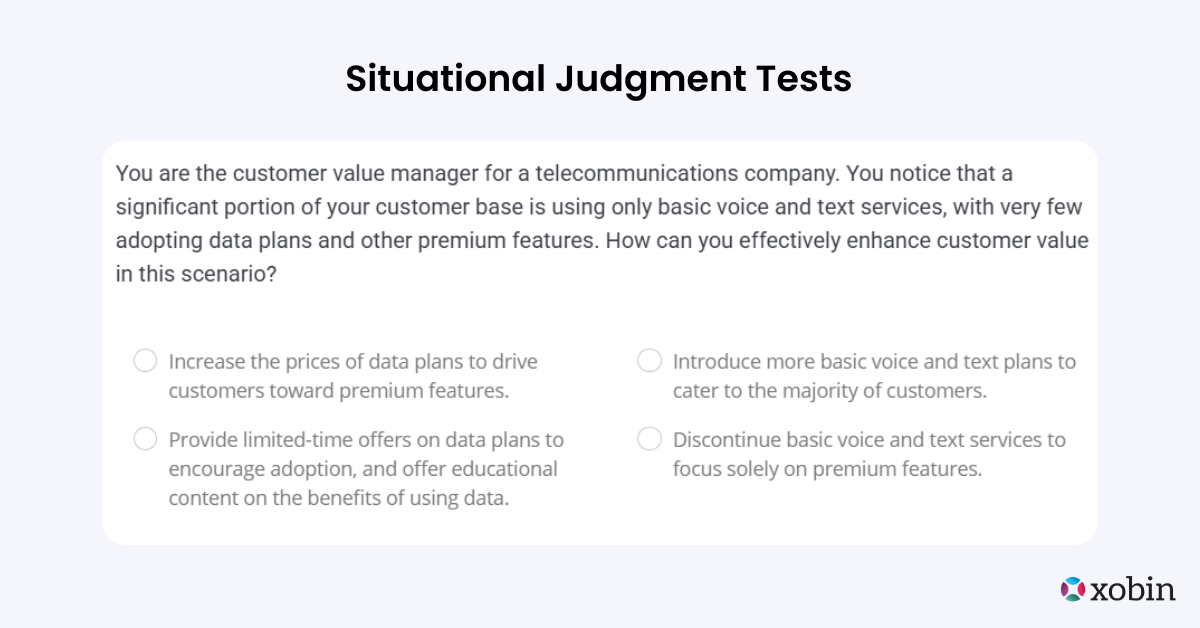
Situational judgment tests (SJTs) assess how candidates would respond to hypothetical, work-related scenarios. These tests are designed to evaluate the candidate’s decision-making, problem-solving, and interpersonal skills.
By introducing scenarios that test ethics, collaboration, and conflict resolution, you can indirectly gauge the presence of dark triad personality. For instance, a scenario may involve a colleague who takes credit for someone else’s work. How a candidate reacts to such a situation can reveal whether they have the moral compass to act ethically or if they would be more likely to exploit the situation for personal gain.
4. Cognitive and Emotional Intelligence Assessments
Another useful tool in identifying dark triad personality is measuring a candidate’s cognitive skills and emotional intelligence (EQ). High emotional intelligence is typically associated with the ability to understand others’ emotions, while low emotional intelligence can indicate a lack of empathy—a hallmark of narcissism and psychopathy.
If you notice that a candidate struggles with understanding the emotions of others or shows a lack of concern for how their actions impact teammates, it may suggest the presence of Dark Triad traits.
5. Reference Checks
Sometimes, the best way to assess a candidate’s true nature is through reference checks. Reach out to former employers or colleagues who can provide insights into how the candidate behaved in previous roles. Ask open-ended questions about the candidate’s interpersonal relationships, ethics, and approach to teamwork.
For example:
- “Did the candidate exhibit any traits that made it difficult for colleagues to collaborate with them?”
- “Can you speak to any instances where the candidate displayed leadership qualities or ethical decision-making?”
Reference checks can provide an honest assessment of the candidate’s personality traits, including any tendencies that align with the Dark Triad.
6. Observing Non-Verbal Cues
In interviews, candidates with dark triad personality may display specific non-verbal cues. For example:
- Narcissists may show signs of self-aggrandizement, such as excessive talking about their accomplishments.
- Machiavellians might give off a calculated or manipulative vibe, often with overly rehearsed responses.
- Psychopaths might display a lack of emotional connection, showing little empathy or remorse in their stories.
Be observant of how candidates carry themselves and how they interact with others, especially if the conversation turns to ethics, teamwork, or past conflicts.
How to Use Psychometric Testing for Assessing Dark Triad Personality?
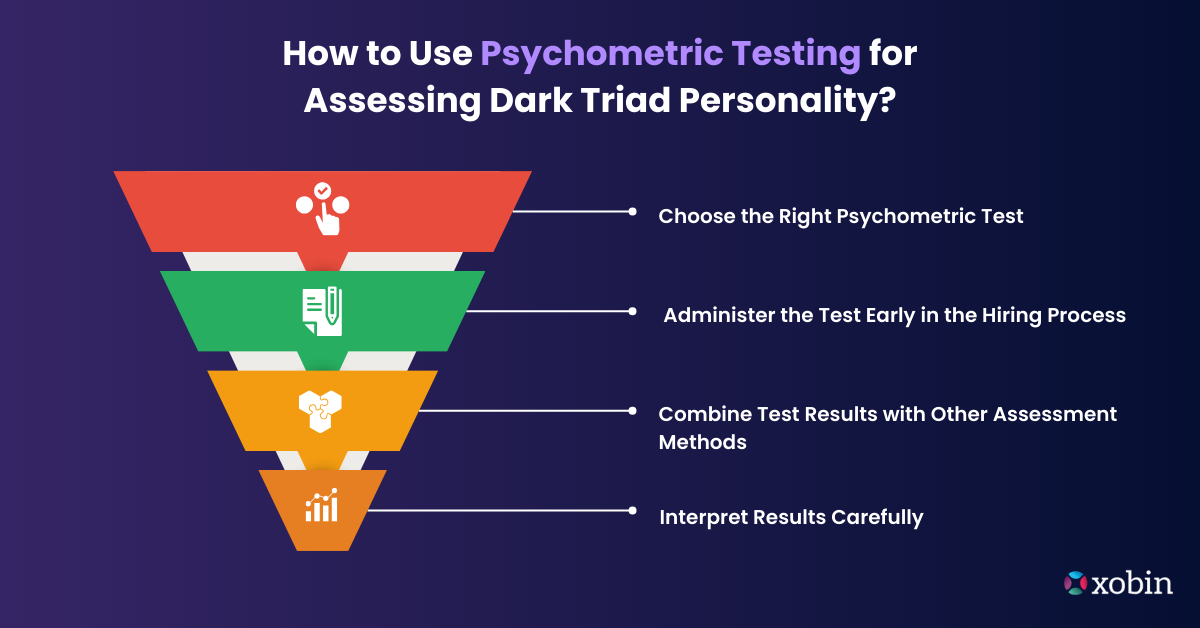
So, how can you integrate psychometric testing into your recruitment process to assess dark triad personality effectively?
Step 1: Choose the Right Psychometric Test
There are many psychometric tests available, but not all of them are designed to assess the Dark Triad specifically. Look for tests that focus on personality traits and emotional intelligence, as these are most likely to include indicators of Machiavellianism, Narcissism, and Psychopathy. Many reputable tests are based on established psychological models, such as the Five-Factor Model of Personality or the dark triad personality test.
Step 2: Administer the Test Early in the Hiring Process
Timing is crucial. Administer the psychometric test as part of the early stages of the recruitment process. Preferably, after the candidate has submitted their resume but before the final interview. This will give you a clearer picture of the candidate’s personality before you invest significant time in interviews.
Step 3: Combine Test Results with Other Assessment Methods
While psychometric testing is valuable, it shouldn’t be the only tool you rely on. Combine test results with structured interviews, reference checks, and practical assessments to gain a well-rounded understanding of each candidate. This holistic approach will help you make more informed, balanced decisions.
Step 4: Interpret Results Carefully
Psychometric tests can provide valuable insights, but interpreting the results requires expertise. Work with HR professionals or psychologists who can interpret the data accurately and in context. Keep in mind that the results are just one piece of the puzzle, other factors, such as skills, experience, and cultural fit, should also play a role in your decision-making process.
How Psychometric Testing Detects the Dark Triad Personality?
Now that we know psychometric testing is a valuable tool for recruiters, let’s take a closer look at how these tests specifically measure the dark triad personality.
Psychometric Testing for Narcissism
To assess narcissism, psychometric assessment focus on traits such as:
- Self-importance: Does the candidate see themselves as superior to others?
- Entitlement: Does the candidate believe they deserve special treatment?
- Lack of empathy: Does the candidate have difficulty understanding or caring about others’ feelings?
Questions may ask candidates to rate statements such as “I deserve special treatment” or “I often feel that I am more important than others.” High scores on these items could indicate narcissistic tendencies.
Psychometric Testing for Machiavellianism
Psychometric tests assess Machiavellianism by looking for traits like:
- Manipulation: Does the candidate engage in deceptive or unethical behavior to get ahead?
- Cynicism: Does the candidate view others as means to an end?
- Strategic thinking: Does the candidate enjoy planning and plotting to gain power or success?
Questions may include statements like “It’s okay to manipulate others to get what I want” or “People are only out for themselves, and I can’t trust them.” Responses indicating a high level of agreement may point to Machiavellian tendencies.
Psychometric Testing for Psychopathy
Psychopathy is assessed through traits like:
- Impulsivity: Does the candidate make decisions without considering the consequences?
- Lack of empathy: Does the candidate seem indifferent to others’ suffering?
- Ruthlessness: Does the candidate exhibit aggressive or callous behavior when pursuing goals?
You may ask questions to candidates like “I don’t feel guilty when I hurt others” or “I act impulsively without considering the consequences.” A high score on these questions can indicate psychopathic traits.
Use Xobin’s Psychometric Testing Software to Evaluate Dark Personality Traits
Xobin’s Psychometric Testing Software not only helps in assessing cognitive abilities and skills but also plays a crucial role in identifying dark personality traits that may affect workplace dynamics. These traits, such as narcissism, Machiavellianism, and psychopathy, can lead to toxic behavior and hinder team performance. Our software evaluates these traits through scientifically designed tests that help identify potential red flags early in the hiring process.
- Specialized behavioral tests to detect manipulative tendencies, lack of empathy, and impulsivity.
- Spot candidates who may exhibit manipulative or self-serving behavior, preventing future workplace conflict.
- Assess interpersonal traits like empathy and social skills to ensure cultural fit and collaboration.
- Gauge work ethic traits, such as integrity and confidentiality, to hire employees who adhere to high moral standards.
- Identify candidates with emotional intelligence to ensure a supportive and resilient work environment.
Don’t let the Dark Triad sneak into your hiring process—use Xobin’s psychometric testing to help you identify these traits before they become a problem. After all, the right hires make all the difference. Book a personalized demo today!
